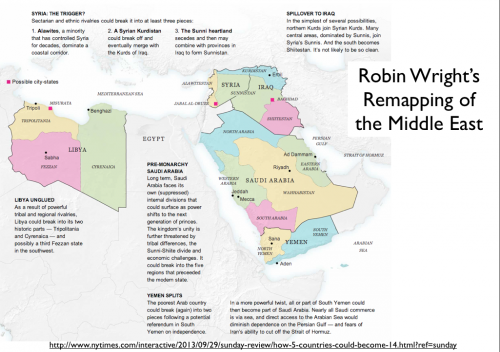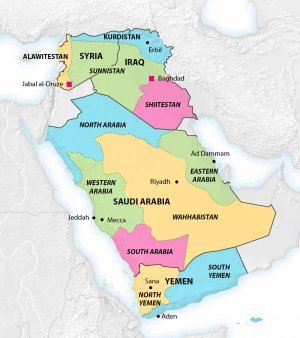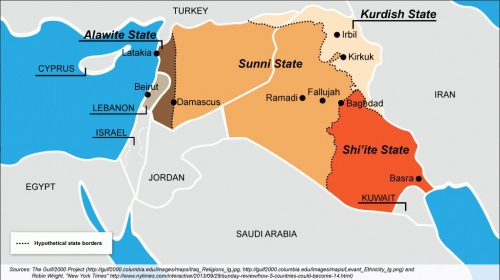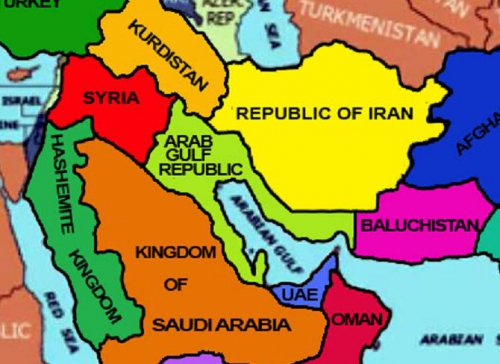mardi, 31 mars 2015
Israel’s Future Vision of the Middle East

Israel’s Future Vision of the Middle East
|
Ex: http://www.strategic-culture.org |
|
Beginning in 1982 with the «Yinon Plan», a proposed Israeli future for a Middle East based on a series of failed Arab states divided into warring smaller fiefdoms, and maturing in the 1990s with Binyamin Netanyahu’s commissioned policy paper called «A Clean Break,» which foresaw scrapping the entire peace process with the Palestinians, Netanyahu enters his fourth term as prime minister in command of an Israel that has scrapped a Palestinian state and which has provided assistance to the Salafist/Saudi axis in support of the Islamic State, Al Qaeda, and other radical jihadist groups. Today, as a result of Israeli right-wing/Saudi/Gulf Wahhabist collusion, Iraq, Syria, Libya, and Yemen are failed states and the Middle East is becoming increasingly «balkanized».
In December 2014, a Shin Bet intelligence report revealed that during the first few months of 2015 the disintegration of Iraq, Syria, Yemen, and Libya into warring factions would accelerate. That prediction has materialized. The Israeli report also saw Egypt, Saudi Arabia, and Turkey becoming more autocratic states. That, also, has come about, especially in Saudi Arabia where the new king, Salman, has started to reverse some of the minor reforms instituted by his late predecessor, Abdullah.
The Islamic State/Jabhat al-Nusra unholy alliance with Israel comes as a bitter pill for the Palestinians of the West Bank and Gaza who have never been able to count on the support of the duplicitous Saudis and Gulf Arabs when it comes to the overall strategic and sectarian interests of the Saudis and Persian Gulf sheikhdoms. Riyadh, Doha, and Abu Dhabi place greater value on their unsigned pact with Israel against Shi’a Iran, Alawite Syria, and Hezbollah-controlled southern Lebanon than in any commitment to the Palestinian cause of self-determination. This abandonment of the Palestinians by the Wahhabist Muslims was always a foregone conclusion since the pampered Saudis and their Gulf friends have historically harbored a deep-seated jealousy of the better-educated and more resourceful people of Palestine.
The Shin Bet report also saw Libya being divided into three states – Cyrenaica in the east, Tripolitania in the west, and Fezzan in the Saharan south. Cyrenaica is dominated by local jihadists who have pledged their loyalty to the Islamic State and showed their commitment to the Islamic State’s self-declared caliph, Abu Bakr al-Baghdadi, by beheading 21 Egyptian Coptic oil workers who were taken prisoner. Yemen and Iraq are the scenes of bloody civil wars between proxy forces loyal to the Saudis and the Iranians. In Iraq, the Islamic State swept into control of large portions of the north and west of the country, committing genocide against Kurds, Yazidis, Shi’as, resistant Sunnis, Christian Assyrians and Chaldeans, and Turkmen while destroying their religious and historical shrines. The United States has, under Central Intelligence Agency pro-Saudi director John O. Brennan, never displayed a more inconsistent policy in the Middle East. Washington’s role is duplicitous in Iraq and Syria, where it, like Israel, supports groups allied with the Islamic State with weapons while, very much in opposition to Israeli and Saudi goals, militarily supports Iranian counter-offensives near Tikrit and Syrian operations against the jihadists in eastern Syria. It is also noteworthy that the Islamic State, which is now active near Jordan’s Ma’an region and in the Sinai Peninsula, where the Ansar Bait al-Maqdis group, a group allied with the Islamic State, has targeted Egyptian security personnel, has not made any moves against Israel, which has a significant presence in both Jordan and Sinai. Israel is more interested in supporting any group, including Sunni jihadists who have beheaded Americans, Britons, Japanese, and others, against Shi’a Iran, Syria, Lebanese Hezbollah, and the Houthis in Yemen. Hamas in Gaza, like the Fatah government of the Palestininian Authority in Ramallah in the West Bank, feels betrayed by the Saudis, Qataris, and other Wahhabist nations. For that reason, Iran began providing covert military aid to Hamas in the West Bank. It is clear that the Islamic State would take the beheading swords to both Hamas and Fatah Palestinians if they were ever to take over in Gaza or Palestinian sectors of the West Bank. Covertly, the Israelis relish in such a prospect. The Saudis claim nine other nations, including Egypt, Morocco, Pakistan, the Gulf states, and Sudan, have joined its military campaign in Yemen against the Shi’a Houthis. The Saudis have called their assault in Yemen Operation DECISIVE STORM, which sounds much like America’s Operation DESERT STORM against Saddam Hussein in 1991. The Houthis, backed by Iran and Lebanese Hezbollah, succeeded in driving out the pro-Saudi and pro-U.S. Yemeni government from Sana’a, Taiz, and Aden. Behind Saudi Arabia’s DECISIVE STORM is the hidden hand of Israel, which has made no secret of its military and intelligence alliance with the Saudis against Iranian influence in the Middle East. One country that has rejected any role in Saudi aggression in the region is Oman, which has served as a diplomatic bridge between the West and Iran and between Sunnis and Shi’as. Oman also has an interest in countering Saudi jihadist expansion in the former independent nation of South Yemen, which has always adhered to a secular profile against Saudi-financed radicalization in the Hadhramaut, the South Yemeni region that borders Oman.
Houthi leaders said their interest in driving into South Yemen was to root out Islamic State and Al Qaeda elements and that they had no desire to remain in control. Indeed, there is some indication that the Houthis agreed to allow South Yemen to have its independence restored. But that was not in the interest of the Saudis, who worked behind the scenes with Zionists in the U.S. State Department to create a six-region federation of Yemen, one that saw the rights of the Houthis diminished. It was this Feierstein Plan, named after Gerald Feierstein, the former Jewish-American ambassador to Yemen, which triggered the Houthi rebellion in the first place. Feierstein wanted to diminish the role of the Houthis and the Southern Yemeni independence Hirak movement in his plan for a federal Yemen because he saw both groups as proxies for Iran. Yemen’s disintegration is a direct result of the actions of a dupe for Israel who also happened to control the U.S. embassy in Sana’a. The Omanis know this is the case and so do the Iranians. In fact, Houthi leaders have correctly ascertained that the Islamic State and Al Qaeda were formed as the result of a conspiracy hatched by Israel, Saudi Arabia, and Brennan’s CIA. Brennan recently told Fox News that the Islamic State was on the run in Syria and Iraq. Not only is Brennan’s contention patently false – and Brennan knows it is because he tacitly supports Saudi, Israeli, and Qatari assistance to Sunni jihadists in both countries – but the Islamic State has expanded its operations into Tunisia from Libya, as witnessed by the recent attack on tourists in Tunis, and Nigeria, as shown by the fealty sworn to the Islamic State by the Boko Haram jihadists. Boko Haram’s operations have also spread into Niger, Chad, and Cameroon. Brennan has every reason to soft peddle the Saudi/Israeli/Gulf Arab alliance that supports the most radical elements of Sunni Wahhabist Islam. Brennan’s support for the Yinon Plan, Clean Break, and Saudi Arabia’s DECISIVE STORM stems from his taking his marching orders from Jerusalem, Riyadh, and Doha. |
00:05 Publié dans Actualité, Géopolitique | Lien permanent | Commentaires (0) | Tags : actualité, géopolitique, politique internationale, moyen orient, proche orient, levant, israël, syrie, irak, arabie saoudite, yemen, sunnites, chiites, monde arabe, monde arabo-musulman |  |
|  del.icio.us |
del.icio.us |  |
|  Digg |
Digg | ![]() Facebook
Facebook



 The Israelis predicted that Syrian president Bashar al-Assad would rule over what the Israelis called "Little Syria," withy effective control of only 20 to 30 percent of the country. The Israelis saw the remainder of Syria in the hands of jihadist groups like the Islamic State and Jabhat al-Nusra, with smaller cantons in the hands of Syrian Kurds and non-jihadist Sunni tribes, all of which would be fighting each other, as well as against the Assad government. The report supported Israel enhancing its position in the Golan Heights. In fact, Israel has done much more than that. The Jewish state has actively supported logistically and with weapons and intelligence Syrian and foreign jihadists, including Jabhat al-Nusra and the Islamic State forces that have militarily engaged Assad’s forces and Lebanese Hezbollah near the Golan Heights, which remains in Israeli hands without any threat to Israel’s interests in the region from the Islamic State.
The Israelis predicted that Syrian president Bashar al-Assad would rule over what the Israelis called "Little Syria," withy effective control of only 20 to 30 percent of the country. The Israelis saw the remainder of Syria in the hands of jihadist groups like the Islamic State and Jabhat al-Nusra, with smaller cantons in the hands of Syrian Kurds and non-jihadist Sunni tribes, all of which would be fighting each other, as well as against the Assad government. The report supported Israel enhancing its position in the Golan Heights. In fact, Israel has done much more than that. The Jewish state has actively supported logistically and with weapons and intelligence Syrian and foreign jihadists, including Jabhat al-Nusra and the Islamic State forces that have militarily engaged Assad’s forces and Lebanese Hezbollah near the Golan Heights, which remains in Israeli hands without any threat to Israel’s interests in the region from the Islamic State.

Les commentaires sont fermés.